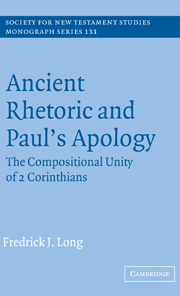Book contents
- Frontmatter
- Contents
- List of figures
- List of tables
- Preface
- List of abbreviations
- 1 An apology for the unity of 2 Corinthians
- Part 1 A survey of ancient forensic discourse
- 2 The anatomy of a genre: sources, nature, and features of forensic rhetoric
- 3 Forensic exigency
- 4 Forensic invention
- 5 Forensic disposition
- 6 Apologetic letters
- Part 2 A rhetorical analysis of 2 Corinthians as ancient apology
- Appendix I How the peroratio (12.11–13.10) summarizes 2 Corinthians
- Appendix II Topoi for each subtype of the qualitative stasis
- List of references
- Index of biblical references
- Index of ancient authors and sources
- Subject index
5 - Forensic disposition
Published online by Cambridge University Press: 12 November 2009
- Frontmatter
- Contents
- List of figures
- List of tables
- Preface
- List of abbreviations
- 1 An apology for the unity of 2 Corinthians
- Part 1 A survey of ancient forensic discourse
- 2 The anatomy of a genre: sources, nature, and features of forensic rhetoric
- 3 Forensic exigency
- 4 Forensic invention
- 5 Forensic disposition
- 6 Apologetic letters
- Part 2 A rhetorical analysis of 2 Corinthians as ancient apology
- Appendix I How the peroratio (12.11–13.10) summarizes 2 Corinthians
- Appendix II Topoi for each subtype of the qualitative stasis
- List of references
- Index of biblical references
- Index of ancient authors and sources
- Subject index
Summary
Discernible rhetorical disposition
By disposition, I mean the intentional arrangement of the speech according to conventional sections which attempts best to foster favorable attention and persuasion in the audience. Different terms for disposition include partes-system, τάξις, arrangement, composition, collatio, distribution, division, and organization (Carrino, 1959). George H. Goebel (1983, pp. 201–202) argues that “Disposition is a matter of the end rather than the means – what point you want to make rather than how you make it – and it is no accident that the ancient rhetorical handbooks almost invariably define the main parts of the speech according to the purposes they serve.”
It is important to understand, as Goebel's definition indicates, that disposition was an extremely critical component in the rhetorical process. Enos (1985, p. 109) summarizes Cicero's view of the matter: “Throughout his career Cicero saw arrangement as central to composition, believing that invention is localized, that ideas must be appropriate not only to the situation but also to the proper place within the discourse.” This is arguably true for the earliest orators and rhetorical theorists.
Nevertheless, disposition as a feature of ancient rhetoric surprisingly is devalued or ignored by current interpreters. There are two reasons for this. First, Plato and Aristotle disparaged speech disposition (Pl. Phaedr. 266de–267a; Arist. Rhet. 3.13.3, 5; cf. 2.26.5). Both do so explicitly in criticism of the dispositional teaching of Theodorus. Aristotle reduced disposition to two components: prothesis and proof (Rhet. 3.13.1–3). (In actuality Aristotle allowed for more; see below.)
- Type
- Chapter
- Information
- Ancient Rhetoric and Paul's ApologyThe Compositional Unity of 2 Corinthians, pp. 71 - 96Publisher: Cambridge University PressPrint publication year: 2004



